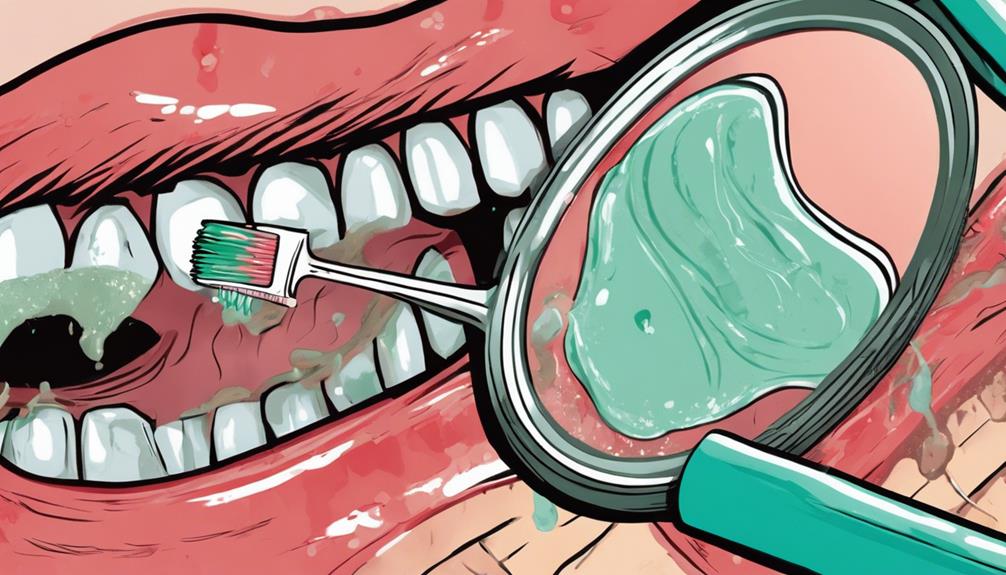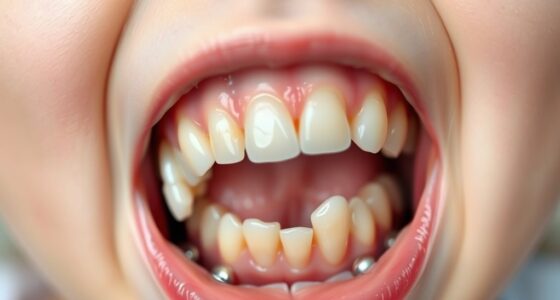Your breath might smell bad due to several reasons. Poor oral hygiene leads to bacteria buildup, while food like garlic and onions lingers in your system. Dry mouth, often from dehydration or medications, increases bacteria growth, and tobacco use adds its own set of odors. Medical conditions like diabetes or GERD can also affect your breath. Don't forget about bacteria on your tongue, inadequate dental care routines, and lifestyle choices. Managing stress and hormonal changes can help too. To tackle these issues and regain your fresh breath, keep exploring effective solutions.
Key Takeaways
- Poor oral hygiene allows bacteria to thrive, leading to bad breath; ensure regular brushing and flossing to maintain freshness.
- Bacteria on the tongue can cause halitosis; incorporate tongue cleaning or scraping into your daily oral care routine.
- Gum disease, indicated by swollen or bleeding gums, contributes to persistent bad breath; regular dental check-ups can help identify and manage this condition.
- Dry mouth can exacerbate bad breath; stay hydrated and consider sugar-free gum to stimulate saliva production.
Poor Oral Hygiene

Poor oral hygiene is the primary culprit behind bad breath, as neglecting to brush and floss regularly allows bacteria to flourish and produce unpleasant odors. When you don't clean your teeth effectively, food particles and plaque accumulate, creating the perfect environment for bacteria to thrive. These bacteria generate foul-smelling compounds that linger in your mouth, leading to persistent halitosis.
One often-overlooked area is your tongue. The back of your tongue can trap bacteria and odor-causing compounds, so regular tongue cleaning is essential for combating bad breath.
Additionally, if you wear dental appliances like dentures or braces, you must clean them thoroughly. Neglecting these devices can result in bacteria and food particles building up, worsening your breath.
Gum disease, frequently stemming from poor oral hygiene, not only contributes to bad breath but can also lead to serious dental issues if left untreated.
To keep your breath fresh and your mouth healthy, prioritize regular brushing, flossing, and tongue cleaning. Don't forget those routine dental check-ups and professional cleanings, too; they're crucial for identifying and addressing any poor oral hygiene practices that could be affecting your breath.
Odor-Causing Foods

Certain foods, especially those rich in sulfur like garlic and onions, can linger in your system and greatly impact your breath. These odor-causing foods release sulfur compounds that aren't just temporary nuisances; they can affect your breath for up to three days after consumption.
Other strong-smelling foods, such as cheese, pastrami, and various spices, also contribute to halitosis. When bacteria in your mouth break down these foods, they release particles that create unpleasant odors.
Alcohol is another culprit. It not only reduces saliva production but also introduces compounds that can lead to bad breath. Even citrus fruits, while invigorating, can temporarily alter your breath due to their acidity, which may promote bacterial growth in your mouth.
Lastly, if you're skipping meals, your body starts breaking down fat for energy, releasing unpleasant chemicals that negatively affect your mouth's odor.
To combat halitosis, it's a good idea to be mindful of these odor-causing foods and consider your overall diet. Staying hydrated and maintaining a balanced intake can help keep your breath fresher.
Dry Mouth Issues

While odor-causing foods can greatly impact your breath, dry mouth can further exacerbate the problem by reducing saliva production and allowing bacteria to thrive.
Dry mouth, or xerostomia, occurs when your body doesn't produce enough saliva. This lack of saliva means food particles and bacteria linger in your mouth, leading to bad breath.
Several factors can contribute to dry mouth. Certain medications, dehydration, and health conditions like diabetes or Sjögren's syndrome can all play a role. When you're not producing enough saliva, your mouth can feel sticky, and you may struggle to swallow, which are clear signs you need to address the issue.
To combat dry mouth and its effects on your breath, staying hydrated is essential. Drinking plenty of water throughout the day helps keep your mouth moist. You can also chew sugar-free gum or use artificial saliva substitutes to encourage saliva production.
Tobacco Use

Using tobacco not only harms your lungs but also greatly contributes to bad breath due to the harmful chemicals that linger in your mouth. The volatile compounds in cigarette smoke create a persistent odor that clings to everything, from your clothes to your skin. Plus, tobacco use often leads to dry mouth, reducing saliva production. Without adequate saliva, bacteria thrive, worsening your bad breath.
Here's a quick look at the impact of tobacco use on your oral health:
| Impact | Effect on Breath |
|---|---|
| Harmful chemicals | Persistent unpleasant odor |
| Dry mouth | Increases bacteria growth |
| Gum disease | Causes halitosis |
| Clinging odor | Sticks to clothes and skin |
| Quitting | Improves breath within weeks |
If you're a smoker, consider quitting. Studies show that many former smokers notice a significant reduction in bad breath shortly after they stop. By kicking the habit, you'll not only improve your breath but also enhance your overall oral health. It's a win-win!
Medical Conditions

Medical conditions can particularly contribute to bad breath, with issues like diabetes and GERD often leading to unpleasant odors in your mouth. Additionally, respiratory infections and sinus conditions can also cause bad breath. It’s important to monitor and address the oral hygiene of children to prevent bad breath in children, as it can be an indicator of other health issues. Regular dental check-ups and proper oral care can help address and prevent bad breath in both adults and children.
If you have diabetes, the presence of ketones can cause a fruity smell. This is a signal your body isn't processing glucose properly.
Similarly, if you suffer from GERD, stomach acids can flow back into your esophagus, creating a sour or bitter odor that lingers.
Chronic sinus infections can also play a role. When mucus accumulates in your throat due to postnasal drip, it mixes with bacteria, exacerbating bad breath.
Liver and kidney diseases can produce unique breath odors; liver failure might give you a musty smell, while kidney disease can lead to a urine-like odor.
Moreover, conditions that cause dry mouth, like Sjögren's syndrome or certain medications, greatly increase your risk of halitosis.
Saliva is essential for washing away food particles and bacteria, so a reduction in saliva can leave your mouth vulnerable to unpleasant smells.
If you suspect a medical condition is causing your bad breath, it's best to consult a healthcare professional for proper diagnosis and treatment.
Gum Disease

Gum disease, a common yet serious condition, can lead to persistent bad breath due to the bacteria that thrive in inflamed gums. When plaque and tartar build up on your teeth, they can cause inflammation and infection, which contributes to unpleasant odors.
If you're experiencing bad breath, it's important to recognize the signs of gum disease:
- Persistent Bad Breath: This isn't just morning breath; it lingers throughout the day.
- Swollen or Bleeding Gums: If your gums bleed when brushing or flossing, this is a warning sign.
- Pockets Between Teeth and Gums: These pockets harbor bacteria, worsening your breath.
The bacteria associated with gum disease produce sulfur compounds that greatly contribute to foul-smelling breath.
To combat this, prioritize effective oral hygiene practices. Brush your teeth twice daily, floss regularly, and consider using an antibacterial mouthwash.
Regular dental check-ups and professional cleanings are vital for preventing and treating gum disease. By taking these steps, you can manage gum disease and improve your breath, ensuring a healthier smile and confidence in social situations.
Bacteria on the Tongue

Your tongue's uneven surface can trap food particles and bacteria, which often leads to bad breath.
Studies show that a significant number of people with persistent halitosis have bacteria lurking on their tongues.
Tongue Surface Bacteria
Bacteria on the tongue thrive in the nooks and crannies of its uneven surface, making it a major contributor to bad breath. These bacteria produce sulfur compounds that lead to unpleasant odors, especially if you don't maintain proper oral hygiene.
Here are three important points to evaluate regarding tongue surface bacteria:
- Location Matters: The back of your tongue is particularly prone to bacterial growth, so it requires extra attention during your oral care routine.
- Regular Cleaning is Key: Cleaning your tongue can greatly reduce the levels of foul-smelling bacteria. Studies show that regular tongue cleaning can be as effective as mouthwash in combating bad breath.
- Impact of Poor Hygiene: Neglecting your tongue can lead to a higher likelihood of halitosis. Bacteria flourish in areas where oral hygiene is lacking, making it essential to incorporate tongue cleaning into your daily routine.
Scraping for Freshness
Scraping the tongue is a simple yet effective way to banish bad breath by eliminating odor-causing buildup. The uneven surface of your tongue can trap odor-causing bacteria, leading to unpleasant breath. By incorporating tongue scraping into your daily routine, you can greatly reduce this issue. It helps remove bacteria and food particles, preventing the production of sulfur compounds that contribute to halitosis.
Studies show that using a tongue scraper can be more effective than brushing your tongue with a toothbrush alone. These specially designed tools effectively clear away the buildup that brushing might miss. Regular tongue scraping can decrease volatile sulfur compounds, improving your overall breath freshness.
Inadequate Dental Care

If you're not brushing and flossing regularly, you're setting the stage for bad breath.
Food particles and plaque can quickly build up, creating a perfect environment for odor-causing bacteria.
To keep your breath fresh, make sure you prioritize these essential dental care practices.
Importance of Regular Brushing
Regular brushing is essential for maintaining fresh breath, as it prevents food particles and plaque from building up in your mouth. When you neglect brushing, bacteria thrive, leading to bad breath and other oral hygiene issues.
To keep your breath fresh and your mouth healthy, make sure to follow these three key practices:
- Brush Twice Daily: Make brushing a habit, and aim for at least two times a day. This helps remove plaque and food debris effectively.
- Clean Your Tongue: Don't forget your tongue! It can harbor odor-causing bacteria, so use a tongue scraper or your toothbrush to clean it gently.
- Use Fluoride Toothpaste: Choose a toothpaste with fluoride, as it helps fight cavities and strengthens enamel, contributing to better overall oral hygiene.
Flossing for Freshness
Flossing daily is essential for keeping your breath fresh, as it removes food particles and plaque that your toothbrush can't reach. When you neglect to floss, food debris can accumulate between your teeth, creating a breeding ground for odor-causing bacteria. This buildup considerably contributes to bad breath. In fact, studies show that regular flossing can reduce the risk of gum disease—a major contributor to bad breath—by up to 40%.
By incorporating flossing into your oral hygiene routine, you help eliminate the plaque and debris that toothbrushes alone might miss. Poor oral hygiene practices, including skipping flossing, can lead to tartar formation, which harbors bacteria and exacerbates bad breath issues.
A survey revealed that nearly 30% of individuals with bad breath reported not flossing regularly. If you want to maintain fresh breath, committing to daily flossing is a must.
Diet and Lifestyle Choices

Your diet and lifestyle choices play an essential role in either combating or contributing to bad breath. What you eat and how you live can greatly impact your oral health. Here are some key factors to take into account:
- Odor-Causing Foods: Foods like garlic, onions, and certain spices can linger in your system, leading to persistent bad breath. When these compounds enter your bloodstream, they're released through your lungs until fully metabolized.
- Hydration: A high-sugar diet can't only promote plaque buildup but also contribute to dry mouth. Dehydration reduces saliva production, which is vital for neutralizing odor-causing bacteria in your mouth. Make sure you're drinking enough water daily.
- Tobacco Use: Smoking and using tobacco products can create unpleasant mouth odors. They also worsen gum disease, which further exacerbates bad breath issues.
Stress and Hormonal Changes

When you're stressed, you might notice a dry mouth, which can lead to bad breath due to reduced saliva.
Hormonal changes, especially during menstruation or pregnancy, can also impact your breath by altering saliva flow and increasing gum disease risk.
Plus, stress can worsen digestive issues, making foul odors more likely to linger in your mouth.
Stress-Induced Dry Mouth
Stress can greatly reduce saliva production, leading to dry mouth and an increased risk of bad breath. When you're stressed, your body prioritizes survival over saliva production, which is essential for maintaining oral hygiene. A lack of saliva can allow odor-causing bacteria to thrive, contributing to unpleasant breath.
Here are three ways to manage stress-induced dry mouth:
- Stay Hydrated: Drink plenty of water throughout the day to help keep your mouth moist and rinse away bacteria.
- Practice Relaxation Techniques: Engage in deep breathing, yoga, or meditation to reduce stress levels, which can improve saliva production.
- Maintain Good Oral Hygiene: Brush and floss regularly, and consider using alcohol-free mouthwash to avoid further drying your mouth.
Hormonal Impact on Breath
Hormonal fluctuations can considerably influence saliva production, leading to dry mouth and an increased risk of bad breath. During times of hormonal changes, such as menstruation or menopause, your body may produce less saliva, which is essential for washing away food particles and bacteria in your mouth. This dryness creates a perfect breeding ground for the bacteria that cause halitosis.
Stress, too, can play a significant role. When you're stressed, your body activates its fight-or-flight response, which often reduces saliva flow. Elevated cortisol levels during stressful periods further disrupt the balance of oral bacteria, exacerbating bad breath. Hormonal imbalances can also worsen conditions like gum disease, which is closely linked to persistent bad breath.
To combat these issues, focus on stress management techniques and maintaining hormonal balance. Regular exercise, adequate hydration, and a balanced diet can support saliva production and improve oral health.
Digestive Changes From Stress
Changes in your digestive system can occur as a result of stress and hormonal fluctuations, leading to issues that may contribute to bad breath.
When you're stressed, your body produces more stomach acid and alters gut motility, which can release foul-smelling gases. Additionally, stress affects saliva production, resulting in dry mouth (xerostomia). This condition reduces your mouth's ability to cleanse itself, allowing odor-causing bacteria to thrive.
Here are three ways stress can impact your breath:
- Increased Stomach Acid: Elevated levels can lead to reflux, causing stomach contents to flow back into the esophagus, producing unpleasant odors.
- Dietary Changes: Stress often leads to unhealthy eating habits, including the consumption of high-sugar and odor-causing foods, which can worsen bad breath.
- Gut Microbiota Imbalance: Stress-related changes can disrupt the balance of bacteria in your gut, resulting in the production of volatile sulfur compounds that contribute to halitosis.
Addressing stress and its effects on your digestive system can greatly improve your breath and overall well-being.
Frequently Asked Questions
How to Fix Stinky Breath?
To fix stinky breath, brush your teeth twice daily, floss regularly, and use mouthwash. Clean your tongue, stay hydrated, and chew sugar-free gum. These steps will help freshen your breath and eliminate odors effectively.
Can Bad Breath Be Cured?
Yes, bad breath can be cured. By improving your oral hygiene, addressing underlying health issues, and making dietary changes, you can greatly reduce or eliminate halitosis. Regular dental check-ups also help maintain fresh breath.
What Does It Mean if Your Breath Smells Really Bad?
If your breath smells like a forgotten garbage can, it might signal underlying health issues. Persistent bad breath can indicate infections or conditions needing attention, so don't ignore it—seek advice from a healthcare professional.
Why Does My Breath Smell Bad Even After Brushing?
Your breath might smell bad even after brushing because bacteria linger on your tongue, food particles get trapped, or you might have a dry mouth. These factors can create persistent odors despite your efforts to maintain oral hygiene.
How Does Smoking Contribute to Bad Breath and How Can It Be Fixed?
Smoking contributes to bad breath through its drying effect on the mouth, which allows bacteria to thrive. This can lead to a buildup of plaque and gingivitis, causing a foul odor. To combat the shocking effects of smoking on bad breath, quitting smoking, staying hydrated, and practicing good oral hygiene can help freshen the breath.
Conclusion
In the end, fresh breath is like a well-tended garden; neglect it, and it quickly becomes overgrown with weeds.
You've learned that poor oral hygiene, diet, and even stress can contribute to unpleasant odors.
By addressing these factors, you're not just eliminating bad breath but cultivating a vibrant, confident smile.
So, grab that toothbrush, sip some water, and choose your snacks wisely—your breath will thank you, and you'll blossom in every conversation!









